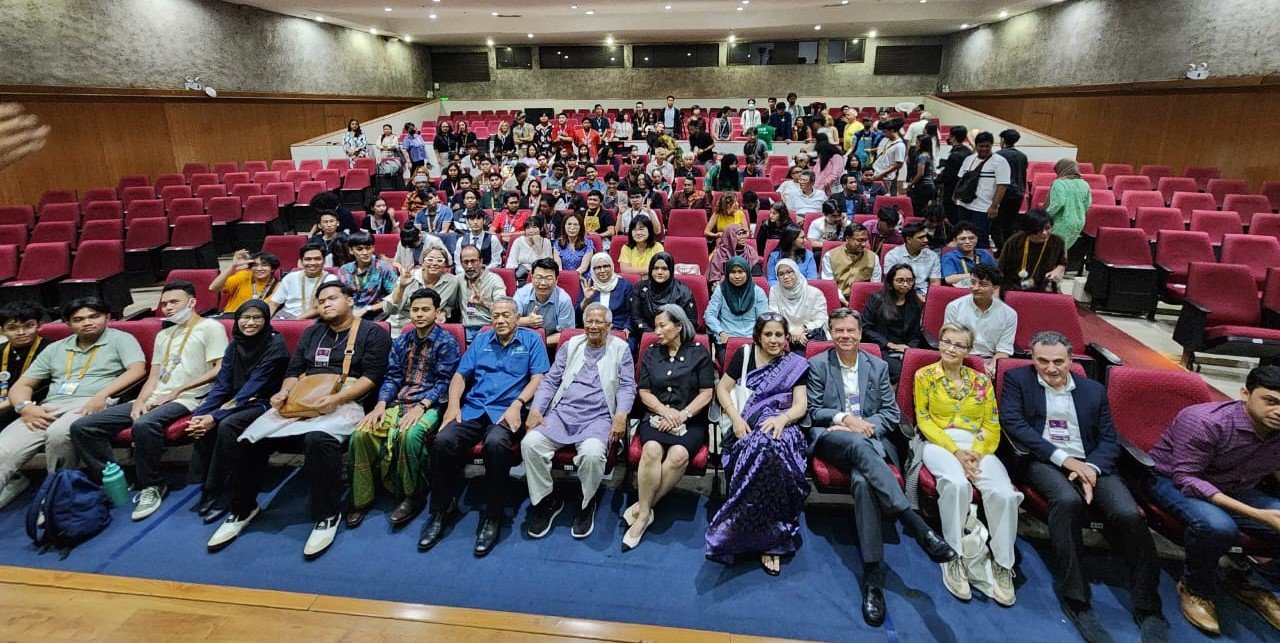Concept Note on NOBIN EQUITY PROGRAMME (NEP) OF THE SOCIAL BUSINESS VENTURE CAPITAL FUND

Concept Note on
NOBIN EQUITY PROGRAMME (NEP)
OF THE SOCIAL BUSINESS VENTURE CAPITAL FUND
Muhammad Yunus
Three Social Business Venture Capital Funds have been created by three organizations: Grameen Telecom Trust, Grameen Trust, and Grameen Shakti Samajik Bybosha. These three organizations independently started operating a programme named Nobin Equity Programme (NEP), through these Funds. They follow common operational procedures.
These Venture Capital Funds are dedicated to provide venture capital to young, literate or illiterate, male or female, persons from low income families to help them establish themselves as successful entrepreneurs. The Funds invest in high-risk, untested youth, in the early stages of their enterprises and start-ups, through a series of investments. As social business initiatives, these Funds do not take any dividend from the businesses they invest in. NEP has a "Service Wing", which provides a wide range of technical assistance to the young entrepreneurs. Entrepreneurs make a monthly payment for this assistance.
The success of these social business venture capital funds is measured by the number of successful entrepreneurs they create in a financially sustainable manner. An enterprise is considered successful if it can attract conventional bank-financing or profit-seeking investors, and doesn’t need to depend solely on its social business investor. However, NEP option always remains open to them.
The programme was launched by Grameen Telecom Trust in a modest way in 2013. It was followed by Grameen Trust and Grameen Kalyan. By the end of 2020, all three venture capital funds have combinedly invested USD 75.5 million in 61,000 Nobin entrepreneurs' projects. During this period, NEP has disinvested USD 47.2 million at original value from these projects; i.e. the ownership have been transferred to the young entrepreneurs to that extent.
The written-off investment amount has remained at a low level of 2%.
DEBT VERSUS EQUITY
There are some common operational features between NEP and microcredit programmes. These operational similarities have created some confusion whether NEP investment is a debt financing or an equity financing. Microcredit departed from the conventional credit operation by discarding some traditional features of debt financing; such as abandonment of collateral, abandonment of lumped repayment at the end of the loan period, charging compound interest etc. It added some new features - introduced weekly payments, weekly meetings of borrowers near their homes, establishing the principle of bank going to borrowers - instead of borrowers going to the bank, taking weekly savings as deposits, and requiring borrowers' commitments to a list of social goals etc.
Conventional features of all debt financing are the followings:
a) Debt is given for a fixed period against collateral.
b) Borrowers pay a pre-determined interest charged on the basis of the duration for which the money is used.
c) Lender is not legally responsible for the liabilities and legal obligations of borrower.
d) If the business fails under debt financing, the borrower continues to remain responsible for paying back the entire loan amount with interest.
Features of equity are different. They are:
a) Equity gives ownership of the enterprise. The enterprise does not pay any interest for the money invested. However, the investor receives proportional share of the profit.
b) Equity entitles the investor to participate in the management or policy making of the enterprise.
c) It brings legal responsibilities of the enterprise to the investor.
d) If the business fails under equity financing, the question of paying the full investment money back to the investor does not arise. The investor, as a shareholder, is entitled to the proportionate share of the net asset of the failed company.
NEP departs from conventional norms of equity investment in several ways, and adopts some features of microcredit operation.
FEATURES OF NEP INVESTMENT
NEP investment fulfills all of the above conditions of equity financing. In addition, it brings some operational features of its own. They are:
a) It is a short term equity investment, initially for a period of two years. As an enterprise grows, NEP can invest for longer terms.
b) As an equity investor, NEP is entitled to the profit of the enterprise. However, being a social business, NEP doesn’t take any profit from the enterprise. (A social business is a non-dividend paying business to solve social problems.) NEP allows its unclaimed profit to be treated as retained earnings, which is the standard practice. As a result, it does not create any liability for the enterprise. Thereby, it enhances the financial strength of the enterprise. To meet the expenses of the company, the entrepreneur may draw from the retained earning, which grows cumulatively as the NEP never claims its share of profit from the company.
c) Another interesting feature of NEP is that, it continuously disinvests in a pre-agreed equal monthly tranches in order to provide the entrepreneurs with increasing ownership. NEP starts with a lumpy investment, followed by a process of an equally spaced disinvestment tranches until the entire investment gets disinvested at the end of an agreed period. NEP's investment goal is to help the entrepreneur to become the owner of the entire business within the stipulated timeframe, and prepare him/her to go into second round of investment, repeating the same procedures as were followed in round one. At the end of second round of investment, the third round begins. This is a process of investment-disinvestment followed by next round of the same process. Hopefully, completetion of each investment-disinvestment process will take the entrepreneur one step up in the economic ladder, and make him a more experienced business person.
NEP investment is typically for two years. However, it may be for one or three years, depending on the level of preparedness of the entrepreneur. Irrespective of the duration of investment, it is always disinvested within the period in equal monthly instalments.
d) There is a big departure in NEP investment from the conventional equity investments. In equity investment, majority shareholder usually retains the management responsibility. In case of NEP, the entrepreneur always retains the management responsibility irrespective of entrepreneur's share in the enterprise. The entrepreneur is always allowed to present himself/herself as the ‘owner’ of the enterprise, although it is a partnership business.
e) Under NEP, an enterprise is created following the formal legal procedure of forming a partnership business through an agreement. It obtains trade license from the appropriate authority.
f) The agreement between the two parties recognizes the entrepreneur as the CEO of the enterprise. Both parties agree on the terms and conditions of this appointment, including the provision for termination of the appointment. The agreement specifies the salary of the CEO for the services the entrepreneur provides to the enterprise.
This encourages unemployed youth to take the top management “job” in a business with a salary. This gives the entrepreneur dignity in the eyes of the society.
g) All the assets the entrepreneur brings to the business (e.g. family space, pre-existing inventory etc) are monetized and recognized as part of the entrepreneur's share in the enterprise.
The sole objective of the NEP is to make the entrepreneur successful and get the original investment money back to NEP according to an agreed schedule. The programme has no intention of claiming any profit from the enterprise or whatsoever.
NEP COMES BUNDLED WITH AN OBLIGATORY TECHNICAL ASSISTANCE SERVICE
NEP bundles its equity programme with an obligatory comprehensive technical assistance and empowering services, offered through its Technical Assistance Wing. Entrepreneurs get into the NEP through this Wing. The entrepreneur has to make a fixed monthly payment for the services. Annual amount paid for this technical assistance and empowering services is fixed at 10% of the investment amount.
The first phase of this obligatory technical assistance begins from the first contact with the potential entrepreneur, and ends at release of fund. This phase is devoted to turning a young person into an investment-ready entrepreneur.
The next step of NEP is to make the entrepreneur interested in going through the project process, including design and funding of project. The entrepreneur may have a project in mind, or may never thought of running a business. NEP's job is to prepare him/her mentally step by step and take him/her all the way to think of business seriously. During this period, the entrepreneur gets skill training on the basic elements of business. It helps the entrepreneur to develop an acceptable project proposal. NEP then handholds the entrepreneur through the entire journey of project approval process followed by the release of funds. NEP runs almost like a 'business school' for the entrepreneurs.
Entrepreneurs are also trained on handling various communication technologies and tools; e.g. how to send business data everyday through SMS, how to record business information in writing etc. They get intrigued by the idea of sending daily business information by SMS. Most of them never used smart phones. Those who used smartphone never used its SMS feature for any purpose.
Payment for technical assistance begins only after the entrepreneur receives the fund. It stops when the entire amount is disinvested. Not everyone who comes for training, which is free of cost for the interested youth, can qualify for receiving any funding. Some drops out at the start of the training, some go all the way, but disqualify.
As a part of the technical assistance, the entrepreneur gets on-going accounting service, monitoring service, trouble-shooting service, market intelligence, networking opportunities and many other services.
NEP's Technical Assistance Wing advises entrepreneurs on legal and regulatory issues as well. It prepares the entrepreneurs on building a long term relationship with NEP. Besides being an investor, NEP wants to be the friend, protector and guide of the entrepreneur. It trains the entrepreneur on long term planning for future expansion, and helps to prepare the business plan for seeking next level of funding. It helps exploring market opportunities. Technical Assistance Wing prepares the entrepreneurs to see each investment as a step towards a series of investments to take them to the highest level of entrepreneurship that they are capable of. The Wing wants to make sure that lack of funds or lack of technical knowledge do not stand on the way to success for any of the entrepreneurs under its wing.
Informal micro entrepreneurs generally do not keep any record of their businesses. If they do, it is not done in a systematic way. They depend on their memory and guesswork. The Technical Assistance Wing changes it completely. Each NEP entrepreneur gets round-the-clock state-of-the-art financial reporting and data service, accounting and MIS services.
NOBODY IS REJECTED
According to NEP policy, nobody is rejected. Those who drop out, NEP keeps track of them and keeps them engaged to instil courage in them to come back and try again. Seeing his/her cohorts moving on, some of them want to try again. Same is done for those who do not qualify for funding at any round.
After the entrepreneur receives the fund, phase II of technical assistance begins and stays with the entrepreneur as long as he/she remains associated with NEP.
The funded entrepreneur gets attached to a field representative of NEP who is located within an easy-to-reach distance. The representative takes the role of a friend, philosopher and guide to the entrepreneur. He is responsible for approximately 150 entrepreneurs within his territory who are engaged in diverse business activities. His assignment is to lead all the entrepreneurs within his geographical area to success. He is told very clearly that the success of his entrepreneurs will define his success. The more uninterrupted rounds of investment he can ensure for his entrepreneurs, the more successful he is in the eyes of NEP. By doing so, he is fulfilling the mission of the NEP by turning unemployed youth into seasoned entrepreneurs.
If a poorly performing entrepreneur drops off after any round, the representative’s responsibility is to inspire him/her to come back, sharpen his/her skills, and get ready for the next round. His role is almost like a dedicated ‘school teacher’ who pays a lot of attention to his poorly performing students, to enable them to overcome their limitations.
The more entrepreneurs go for successive rounds of investments, the more it is demonstrated that the youth within Nobin Equity Programme (NEP) are inspired to continue in the path of entrepreneurship rather than wait in line for job interviews. The more rounds of investments they go through, the more confident they become, and the more they keep on planning for expansion of their businesses. They feel a great sense of joy each time when they successfully complete a round, and become the full owner of their businesses, once again!
NOBIN SOFTWARE SEAMLESSLY GENERATES
DOCUMENTATION OF THE BASE OF RURAL ECONOMY
Under this technical assistance programme, the entrepreneur is trained to send daily financial report through SMS from their mobile phones. Daily financial data of each entrepreneur are collected and analyzed at NEP’s local office as well as head office through a web-based centralized software. All accounting functions, including information on their inventories, are carried out by a tailor-made Nobin software.
This generates enormous business data and business performance records of each enterprise on a daily basis. Data generated by all the businesses funded by NEP present a fresco of the lower end of the rural economy of the entire country at any given time. This becomes a powerful health check of the economy at any moment in time. Larger the NEP's coverage grows, the more insightful this data bank becomes.
FEATURES WHICH ARE ATTRACTIVE TO ENTREPRENEURS
- Most attractive feature of NEP is that the entrepreneur doesn’t have to remain tied up with an investor as a partner.
- It makes the entrepreneur happy that the share of profit of NEP is kept in the business as retained earning. At the end of each investment cycle, this money becomes his/her money, with no restriction on its use whatsoever.
- With the increase of shareholding proportion each month through disinvestment process, the entrepreneur feels encouraged. He/she likes the process of count-down to reaching 100% ownership in easy monthly steps. The entrepreneur knows exactly when he/she would become the full owner of the business.
- Because of NEP’s requirements, the entrepreneur becomes familiar with the use of information technology. He/she can find out all the information about his/her business using the software as well as from Internet.
- Because of NEP’s requirements, the entrepreneur also gets used to use banking services.
- Entrepreneurs feel protected by the fact a nationally known strong financial organization is a formal partner of their businesses.
- The entrepreneur feels comfortable that a group of highly qualified professional people are supervising his/her business on a daily basis. In case of difficulty, he/she is not alone in this uncertain and risky journey, will get supports from the experts.
- Belonging to a system which ensures next level of investment as soon as the current cycle is settled, gives the entrepreneur a sense of security about the expansion of business. This allows entrepreneur to start dreaming about his next level of business size as soon as the current round is set in motion. Headache of finding money to stay on course is no longer there.
The entrepreneur feels that he/she is in command of his/her future. All that he/she has to do now is to stay committed to honesty, creativity and hard work to the best way he can.
He/she feels ready to do that.
Related
15th Social Business Day 2025 to be held on June 27–28
Statement from Professor Muhammad Yunus:
দেশবাসীর উদ্দেশ্যে প্রফেসর ইউনূসের বক্তব্য
Prof. Muhammad Yunus felicitated in Manila on the occasion of his 40th anniversary of receiving the “Ramon Magsaysay” Award.

“র্যামন ম্যাগসাইসাই” পুরস্কার প্রাপ্তির ৪০তম বার্ষিকী উপলক্ষে প্রফেসর মুহাম্মদ ইউনূসকে ম্যানিলায় সম্মাননা প্রদান

Social Business Academia Dialogue & 3ZERO Club Convention 2024 held in Manila, Philippines

The 14th Social Business Day concludes in Manila, Philippines

The 14th Social Business Day 2024 kicks off in Manila, Philippines



